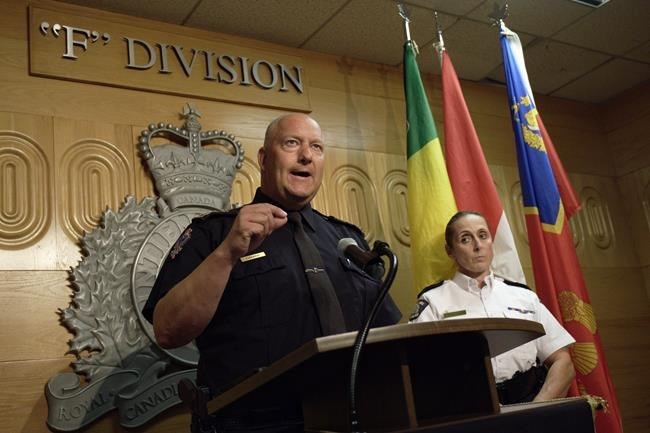An ongoing manhunt for a suspect in a series of deadly stabbings that shattered two small communities in Saskatchewan is raising fresh questions about rural policing in Canada.
Efforts to apprehend Myles Sanderson are likely hampered by the Prairie province's vast geography, network of criss-crossing back roads and underfunded policing services, experts said.
Police officers in the region are often spread thin with massive areas to patrol, said Rick Ruddell, a justice studies professor at the University of Regina.
"Response times in the countryside can be lengthy because there aren't many officers and it's a really big area to patrol," he said.
"Saskatchewan is five times the size of the United Kingdom. There's an incredible amount of space for someone to disappear."
Police continued to search Tuesday for Sanderson, who is wanted in the deadly rampage over the weekend on the James Smith Cree Nation and the nearby village of Weldon, northeast of Saskatoon. Police had said he could be in Regina, a three-hour drive away, but a notice sent via Saskatchewan's emergency alert system Tuesday said he may have been seen on the First Nation.
Another suspect, Sanderson's brother Damien Sanderson, was found dead in a grassy area of the First Nation on Monday, RCMP said.
Ten people were killed and 18 people were injured, not including the suspects.
The lack of officers on the ground and vast geography can hinder the ability to respond in the immediate aftermath of a serious crime before additional resources are brought in, Ruddell said.
"There are a lot of back roads and gravel roads that are maybe only accessible six to eight months a year," said Ruddell, who holds the Law Foundation of Saskatchewan Chair in Police Studies.
"It really increases the complexity of an investigation because if you get a police officer from a few hundred kilometres away, they might not have a very good understanding of the back roads system."
Part of the issue is that many rural and remote areas in Canada are policed by the RCMP, which often rotates officers to different locations.
Sometimes officers aren't on the ground long enough to know the area before being called upon to assist in a manhunt, said Michael Boudreau, criminology professor at St. Thomas University in Fredericton.
"The Mounties who were searching for the suspect during the mass shooting in Nova Scotia didn't even know what road they were on," he said, referring to the April 2020 rampage that left 22 people dead.
One solution is to put in place a local police force with officers who live in the area permanently and know the community and geography, Boudreau said.
"If the person you're trying to catch knows the area better than you, they will be able to elude you for much longer," he said.
Scott Blandford, a former police sergeant in London, Ont., said while mass murders are rare in Canada, the recent stabbings highlight the "cracks" in the policing of rural areas.
"One homicide is a major undertaking for a small police service or small detachment. When you have this many homicides as well as additional injured persons across multiple crime scenes, it really becomes a really taxing situation and they have to depend on external resources," he said.
"It’s what I would call a perfect storm for a small organization."
The need to bring in additional resources can cause a delay in the investigation while the sheer size of the province can be challenging, Blandford said.
"There are so many roads. Where do you set up roadblocks? Where do you focus your resources? That's the challenge," he said.
Meanwhile, police officers on the ground in rural areas across Canada appear to be overworked and under stress, according to research by University of Regina psychology professor Nicholas Carleton.
A study published in the The Canadian Journal of Psychiatry found RCMP officers — many of whom work in rural areas — suffer from a higher level of anxiety than officers on municipal police forces, likely due to working conditions.
This report by The Canadian Press was first published on Sept. 6, 2022.
Brett Bundale, The Canadian Press



